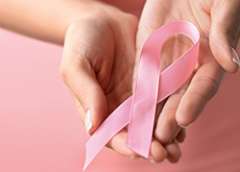Breast Health Information & Guidelines
Find your care
UCLA Health’s Breast care specialists develop a personalized plan to help you recover. For more information, reach a cancer care specialist at 310-825-2144.
Routine care is the best way to keep you and your breasts healthy. Although detecting breast cancer at its earliest stages is the main goal of routine breast care, other benign conditions, such as fibrocystic breasts or cysts, may also be discovered.
It is important to note that while 1 in 8 women in the United States get breast cancer in their lifetime, diagnosing breast cancer early provides the best chance of it being successfully treated or cured. The following are two things you can do to stay healthy.
1. Schedule Your Mammogram
All women should get a mammogram to scan breast tissue for tumors or other abnormalities that might be a sign of breast cancer. Here’s what you need to know:

- A mammogram is typically performed for the first time when a woman is between 40 and 50 years old.
- Women should have a repeat scan every 1 to 2 years.
Your doctor will work with you to determine when you should get your first mammogram and how frequently they should be performed based on your family history and other factors. Find UCLA mammogram locations
2. Report Any Breast Changes
Although regular mammograms are the preferred breast cancer screening tool, you should still be familiar with the way your breasts normally look and feel. You should report any of the following changes to your doctor:
- A change in the look or feel of the breast
- A change in the look or feel of the nipple
- Nipple discharge
If your physician recommends that you have a radiology imaging test, such as a diagnostic ultrasound or mammogram, you should have this performed before you meet with a breast surgeon so that he or she can review your images and reports prior to your appointment.
High Risk Breast Clinic
The UCLA High Risk Breast Clinic offers patients who are at high risk for breast cancer a tailored prevention, screening and risk-reduction care strategy. Eligible patients who are referred into the program meet with a medical oncologist for personalized high-risk counseling. Depending on their personal history and associated risk level, patients may also receive information on complementary therapies for primary and secondary prevention. If needed, patients will also have access to our onsite genetic counselor. Patients with the following risk factors may be referred to our clinic:
- Have a first-degree relative (such as a mother, sister or daughter) under the age of 50 with a diagnosis of breast cancer
- Have multiple family members with breast and ovarian cancer
- Have a male family member with breast cancer
- Are of Ashkenazi Jewish descent with a family history of breast cancer
- Have had a breast biopsy with pathology showing atypical cells, or lobular carcinoma in situ
- Have a known genetic mutation predisposing them to breast cancer development
- Have a history of mantle (chest) radiation for lymphoma
Our multidisciplinary team provides women concerned about breast cancer with an in-depth evaluation about breast cancer, including:
- A hereditary cancer-risk assessment
- A clinical breast exam
- Genetic testing, counseling and education about personal risk of developing breast cancer and potential implications for family members (as indicated)
- Counseling in personalized lifestyle modification and development of an anticancer nutrition plan
- Personalized surveillance and screening plans, as well as prevention programs
By the end of the visit, each patient gains a thorough understanding of what it means to be high risk through personalized discussions of the genetic and lifestyle variables that affect breast cancer risk and the emotional impact of a high-risk designation.
To make an appointment, please call (800) UCLA-MD1 or 310-905-6512